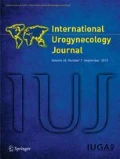Abstract:
Short-form questionnaires were used to measure the change in quality of life (QOL) of women with urge-predominant urinary incontinence treated with imipramine hydrochloride. Short forms of the Incontinence Impact Questionnaire (IIQ-7) and the Urogenital Distress Index (UDI-6) were integrated into a patient questionnaire, which was given to 25 patients with urge-predominant urinary incontinence before and after treatment with imipramine. Demographic data and self-reports of the number of incontinent episodes were also recorded. Total and subscale QOL scores and number of incontinent episodes were recorded and compared with Wilcoxson’s signed ranks test, as well as correlated to the change in number of incontinent episodes with Pearson’s correlation coefficient. Treatment with imipramine resulted in a clinical improvement or cure in 16/22 patients (72.7%), with an average reduction in incontinent episodes of 78.7% (P<0.001). The average per cent improvement in QOL scores for total IIQ-7 was 42.1% (P<0.01) and total UDI-6 score was 44.1% (P<0.001). All subscale QOL differences were also significant (P<0.01). The incidence of side effects to imipramine was 41%, which resulted in dose changes. Fourteen per cent eventually discontinued therapy. Neither total nor subscale QOL improvement scores were correlated with improvement in number of incontinent episodes. The short form IIQ-7 and UDI-6 are effective tools to determine change in QOL, as evidenced by the effectiveness of imipramine for the treatment of urge-predominant urinary incontinence. Significant reductions in incontinent episodes and improvements in IIQ-7 and UDI-6 QOL scores were both seen, but were not correlated. Short-form QOL measures can easily be integrated into a patient questionnaire to objectively measure a very subjective topic.
Similar content being viewed by others
Author information
Authors and Affiliations
Rights and permissions
About this article
Cite this article
Woodman, P., Misko, C. & Fischer, J. The Use of Short-Form Quality of Life Questionnaires to Measure the Impact of Imipramine on Women with Urge Incontinence. Int Urogynecol J 12, 312–316 (2001). https://doi.org/10.1007/s001920170032
Published:
Issue Date:
DOI: https://doi.org/10.1007/s001920170032


